- Home
- Marilyn French
My Summer With George Page 3
My Summer With George Read online
Page 3
But it wasn’t just George’s importunacy. By itself, that never won me over—I never went out with the movie director, for instance. What turned me to mush was his dejection. Sad people touch my heart; they always had, women and men. Some of my best friends are deeply depressed. This has its downside, I have to admit. I get entangled in the idea that I can help them become more cheerful, and of course, I can’t. A number of the men I’d married—my best marriages actually—had been on the depressed side. Charles and Mark. Even Bert, if truth be told, although no one could call that a good marriage. In his case, even depression wasn’t enough…
But on the whole, I understand sadness. I sympathize with it; it is familiar to me. After all, my whole early life was spent in a depressed household, fighting off depression myself. I may be billed as the Queen of Hearts, but I am an ordinary hardworking woman. I may put on a flounced gown and a tiara and have myself photographed on the Altshulers’ grand staircases, but afterward my very bones are tired. I didn’t start out knowing how to behave in rooms of five hundred people—or even five, if they weren’t family. In fact, I am often startled that I did learn these things: I don’t know how I did. Like many of my friends, I’d created myself.
Although today I live in comfort, even luxury, I grew up poor. My family lived in Millington, a pleasant undistinguished town north of Boston. My father, Herman, was exposed to poison gas in the war—World War I, that is. He survived and returned home to marry my mother, Helen, and father five children, but he never really recovered his health, and after many years of illness, he died. Mother was left with five of us, ranging from twelve to two. I was the youngest. Father’s illness and the Depression had depleted their small savings, and they had had to borrow against his life insurance and mortgage the house. Mother was in a pickle. We were too young to be left alone, so she felt she couldn’t go out to work, and besides, she had no particular skills. She believed the only thing she was really good at was baking, so she started baking layer cakes and pies and other confections, and selling them for fifty cents apiece.
That was a fair amount of money during the Depression, when a pound of hamburger cost fifteen cents, but she was an excellent baker and used only the best ingredients—unbleached flour, four score butter, heavy cream, eggs, Swiss chocolate—all the things no one eats anymore. She was a mild woman who unexpectedly exploded on one or two subjects. Baking was one of them: her mouth would curl with contempt at the mere mention of bakers who used lard or Crisco. Mother’s pies were as buttery as shortbread but lighter; her apple, pumpkin, lemon meringue (my favorite), and pecan pies were famous in the neighborhood. She was less imaginative with layer cakes, making only two varieties—a chocolate one with white icing and a vanilla one with chocolate icing—but she made a wonderful cheesecake and a luscious strawberry shortcake and the best cookies I have ever tasted. All our neighbors had enjoyed her baking, sampled at kaffeeklatsches or as gifts offered during illnesses or funerals; the neighbors spread her fame, and her business grew. She began to bake bread and rolls, turning the glassed-in front porch of our house into a full-fledged bakeshop. She made a counter by shirring a long piece of cloth and tacking it onto the front of an old table. At the beginning, we didn’t have glass cabinets like real bakeries: the cakes and pies sat on the table on glass-covered pedestal dishes.
Our big old Victorian house had come down to Mother from her Scots grandmother. It stood on the main street of Millington, a little Massachusetts town whose sole reason for existence, a textile mill, had long since vanished. Mother worked all day and into the night in the big old kitchen at the back of our house, baking, kneading, making dough. Jerry was twelve, and she taught him to chop up fruits and nuts, to knead dough and make frosting—a job she hated. She put my older sisters to work selling. At first, Susan, who was nine, and Merry, who was seven, were very self-important, and Tina and I complained to Mother that they acted as if they were the bosses of us. But soon enough the job became a burden to them, partly because the porch was freezing cold. Mother had storm windows made for the wide glass window panels; she put an electric heater behind the counter and moved our dining room rug to the porch floor. But the porch remained chilly. Susan’s and Merry’s hands and feet were always blue in the winter.
We all missed Father. Well, maybe not Father himself: “Father” was how we referred to our old life, what we called it. I have no memory at all of my father. But once in a while, when Mom went to bed early, we kids would sit around the dinner table putting off doing the dishes, and Susan and Jerry would reminisce about how it was when Daddy was there. They remembered Mom sitting at the kitchen table talking to them while they ate cookies and milk after school; and they remembered going outside to play every single day except when it rained. They had even gone to the beach. When I was five, that awed me: I’d never seen a beach. Jerry and Susan and Merry remembered Daddy walking down the long street from the bus stop after work. He repaired watches in a jewelry shop, but he wasn’t working by the time I was born. In those earlier days, they said, Mom would have dinner on the table as he walked in the door, real dinners, with meat and potatoes and vegetables. And sometimes Daddy would play ball with Jerry after dinner or let Merry hold the hose when he watered the front lawn.
We children resembled our parents: Susan and Merry were square and sturdy, with pale skin, blondish hair, and brown eyes, like Mother; Jerry, Tina, and I were slim and small-boned, with darkish skin and hazel eyes (I always called mine green), like Father. Jerry’s and Tina’s hair was dark brown; mine was a sort of russet, which later turned quite red. Mother was taller than Father, and her height popped up in Jerry, Susan, and me. Merry and Tina were tiny.
But Daddy himself was gone, and Mother had vanished too, gone up in steam and the constant smell of baking cakes and breads. We could not live typical children’s lives. But even with our help, Mom never earned enough to do more than pay the mortgage and the electric bill, buy coal and food. We didn’t have a car or a telephone, we never went to a movie or had a soda at the drugstore. Most nights, dinner was canned soup or eggs. The only thing there was plenty of was unsold bread, cake, or cookies, which made up a large part of our diet. Mother invented a dish made of stale bread broken into little pieces and sautéed in butter with onions, parsley, thyme, and, if she had them, bits of sausage or chicken livers. We loved that. But mostly we ate leftover cake (we all had bad teeth), to the envy of our school friends. But with the perversity of children, we hated having cake for dinner, at least after the first twenty or thirty times.
The worst thing about our house wasn’t the food or the lack of money, though: it was the mood. When I was small, Mom still smiled—she looked at us, talked to us, laughed at us. The family would often go into giggles as we worked together in the kitchen. But although her work became a little easier as we got older—Jerry took over the huge job of making bread, Susan and Merry began to bake the layer cakes, and Tina and I helped tend the shop—Mom became sadder and quieter. I didn’t understand why, and I resented it. I was a callow kid; I had no sense of how she must feel, seeing her life pass in that way. And she always told us that the only thing that mattered to her was us, her kids, our survival, our staying together. Believing her, and knowing we were trying so hard, I felt that the least she could do was be happy. At eight years old, I thought happiness was volitional.
When Jerry finished high school, he found a job in a huge commercial bakery in Bridgeport, Connecticut. Bridgeport was too far away for him to commute even if he’d had a car, so he took a room there. Mother accepted this; she seemed even to have expected it. But for my sisters and me, Jerry’s defection was a terrible rending of family solidarity. All those years, the six of us had struggled as a unit to keep our family alive. We had watched our friends going to movies or football games or away on summer holidays, our faint envy offset by the conviction that we and our work were essential to our family and the family essential to each of us. Jerry’s leaving breached this, even if he sent Mother t
en dollars every week. And besides, we missed him. Jerry was the most fun of all of us, the one Mother loved most. He was the oldest; he’d heard the most laughter in his youth, and it was his nature to crack jokes and tease. And Mother’s matter-of-fact acceptance of his leaving was silently subversive; it implied that the family was not the inviolable unit we had thought it.
Jerry’s leaving had an immediate effect: in her sophomore year, Susan, who was three years younger than Jerry, signed up for the high school’s secretarial course without telling Mother. And on her graduation day, as we celebrated with ice cream (a treat), she announced triumphantly that she was going to New York to get a job in an office.
This Mother did not expect. She cried, “You are what?” and put down her spoon. Our mother, who never scolded or raised her voice, shouted, “You most certainly are not!”
Susan protested: Jerry had left, so why couldn’t she?
But Mother just shook her head. “That’s different; he’s a boy. Nice girls never leave home until they get married…Why do you want to leave home?” Mother continued, looking at Susan suspiciously.
Not understanding Mother’s objections, Susan refused to accept them. There was a YWCA where she could stay cheaply until she got a job; Alice Morrell’s sister had stayed there when she went to New York. And she said that she was a crackerjack typist and could take dictation and would get a job quickly and send money home. She would still help out, she argued.
That didn’t seem to matter to Mother. She stopped speaking—to any of us. On the Sunday of Susan’s departure, she lay in her darkened room with a damp cloth on her head. Merry and Tina and I alternated between tears and wild excitement as we helped Susan pack her clothes and her life’s savings of forty dollars. We had never had a major conflict in our house; we kids might squabble, but Mother never scolded or got angry or even raised her voice. She had always said we were her angel children. Her rage and silence bewildered and terrified us. We went into her room just before Susan left, but Mother refused even to say goodbye. We walked Susan to the bus station, taking turns carrying her bags. I sobbed the whole way there and back. But after her bus left, we had to go home to make the bread and pastry dough. Mother never left her room at all that day.
Susan said Mother would get over it in time. She couldn’t believe Mom would stay angry at her, the daughter who had worked hard and uncomplainingly in the bakery for nearly ten years. None of us guessed that our mild, sweet, vaguely anxious, sad mother would go on regarding Susan as something unspeakable for the rest of her life. The night after Susan left, I found Mother sitting alone in the dark living room. I went and put my arms around her and laid my head on her shoulder. She patted my hand vaguely and murmured, in a voice gravelly with rage, “Promise me you won’t grow up to be a cheap slut like your sister.”
I pulled away in shock. “She’s not a slut!” I didn’t know what a slut was, but I knew it wasn’t good and I knew Susan was good. She was my favorite sister, and if I, too, was a little angry with her, it was only because she had abandoned me, like Jerry. I kept thinking, Mom didn’t get mad at Jerry. It wasn’t fair.
The United States had entered World War II, and there were lots of jobs for women. Susan got a job as a secretary in the pool of an advertising agency in Manhattan. She found an apartment with two other girls. She didn’t earn as much as Jerry did in the bakery, and her expenses were higher—a share in a Manhattan apartment cost more than a rented room and meals in restaurants in Bridgeport—but she sent twenty dollars home every month. She always enclosed a letter with the check, but Mother never read it or wrote back. Merry and Tina and I did, but we didn’t tell Mom, because after one terrible argument, Mother set her lips and said she never wanted to hear Susan’s name mentioned again. Mother always wrote early to invite Jerry home for Thanksgiving and Christmas, but she never wrote Susan, and Susan never came.
This unforgivingness in Mother shocked us, like the discovery that someone you’ve always known has an artificial limb you never noticed. But it intimidated us too, which may have been her purpose—conscious or not. None of us wanted Mother to treat us as she had Susan. So when Merry was graduated, she meekly asked Mother what she should do—work in the bakery, get a job in Millington, or go to a city for work. She too had silently taken the precaution of enrolling in the school’s commercial course, and could type and take stenography. Mother set her lips and said it was up to Merry, that girls these days seemed to do as they pleased. Merry sighed and left the room. She never said another word, just took over as head baker.
But something went out of her. I saw her eyes that autumn as she watched her school friends go off to college or to Boston or Hartford for work. Only a few stayed in Millington; they got crummy jobs at Woolworth’s or the luncheonette or the dry cleaner’s, but at least in places where they could meet people (boys, that is). We met the same people every week, and they were almost all middle-aged women. We never had a full day off—on Sundays, when the bakery was closed, we had to make the dough for Monday’s bread and pies. By now Tina and I were baking too. Occasionally we went to a movie, but that was our only outing.
It was after her graduation that Merry began reading romances. She found them in a little shop in town that bought and sold used books, mostly mysteries, adventure stories, and romances. She could buy a romance for a dollar or seventy-five cents, and sell it back for thirty or forty cents. Later, when paperback books came out, they were even cheaper. Merry began spending most of her allowance on them. I always knew when she’d bought one: after the dinner dishes were done and the bread dough was kneaded for the last time, she would go up to the room she used to share with Susan and get in bed, even if there was a good radio program on downstairs. Since I had already begun experimenting with my body despite my shared room (Tina was a sound sleeper), I suspected that Merry used her reading to arouse her imagination to the same end.
I had always done well in school and was pushed ahead several times, so I finished grade school and entered high school at twelve. I was younger than the other students, but I knew what I wanted. Saying nothing to anyone in the family, I enrolled in the academic course. I told myself that even if I couldn’t go to college, I’d study what I was interested in. I loved Latin and French and math and English literature, and that’s what I studied.
This decision probably marked the first appearance of my bad character. It didn’t matter that I said nothing at home: the entire household had sunk into a somnolent state. Mother worked hard, ate meagerly, and slept; she didn’t even prepare dinner anymore. On Sundays, she paid bills. We worried about her. We tried to get her to go out for a walk with us, but when she did, she would get tired fast. She’d start breathing hard and turn around and go back home. I always grimaced at her, sure she was putting on that breathlessness. She was just bored, I thought. She wanted to go home and sit in the armchair and daydream. I knew all about daydreams.
Mother wasn’t the only depressed person in the house. Merry too had grown silent and sad. Our once cheerful, busy, hardworking house was bleak with depression, which hung over us all like a black umbrella. It grew even thicker after Tina was graduated and, without even discussing it, took her place in the bakery along with Merry.
Though closest to me in age, Tina was the sister I knew least. She was the quietest one in our family. Three years older than I, she was only a year ahead of me in school. I always thought she was a little slow, but her daydreams were ambitious beyond our imagining. We should have guessed, but somehow no one in the family was interested in poor Tina. She just didn’t squeak loudly enough. We thought nothing of the fact that every year, she begged Mother to let her join the Drama Club. But rehearsals took too much time, evenings and afternoons too. Mother couldn’t spare her, and refused. And whereas once she had refused us things sadly, with tears in her eyes, now she just forbade them in a dead hard voice that allowed no argument. Tina never complained, just looked more and more pinched.
Meantime, I went on taking
academic courses and getting A’s, and at the end of my junior year, when my English teacher, Mrs. Sherman, urged me, I applied for college scholarships. I told myself it was just to see, just to find out if I could win one. When, in the spring of my senior year, I got a letter informing me I’d won a scholarship to Mount Holyoke College, I wept. Somehow it was worse than if I hadn’t applied at all. I knew that even if my tuition and room and board were free, I would need money for books, clothes, transportation, daily living. And I knew we were too poor to provide me with that.
After I stopped crying, I went to see Mrs. Sherman. I wanted her to know that she hadn’t wasted her recommendation entirely. Maybe I wanted to brag a little. She listened with twisting mouth—a habit that I believed accounted for all the wrinkles over her upper lip. Concentrating on them got me through my recital without crying. At the end, she said, “Don’t turn it down yet, Elsa. Let me see what I can do.” As I walked home down the broad streets lined with trees that shimmered with just-opened little green bolls, my heart beat in little skips. Knowing it was a hopeless situation, I was full of hope. I told no one at home about it, just put on my apron and washed my hands and relieved Merry at the counter.

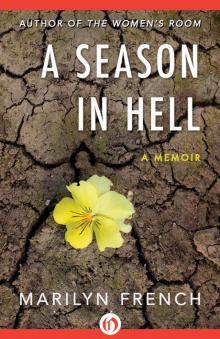 A Season in Hell
A Season in Hell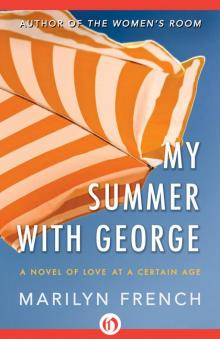 My Summer With George
My Summer With George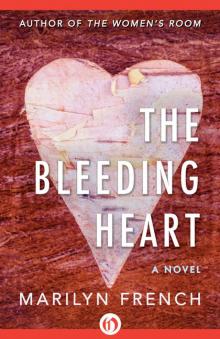 The Bleeding Heart
The Bleeding Heart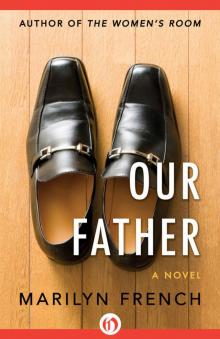 Our Father
Our Father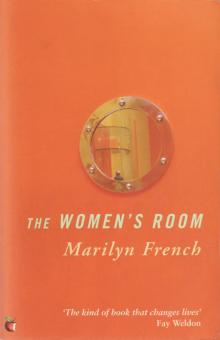 The Women's Room
The Women's Room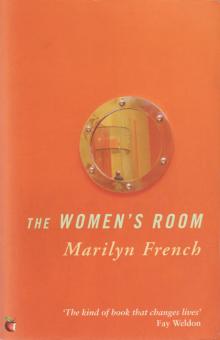 The Women's Room (Virago Modern Classics)
The Women's Room (Virago Modern Classics)